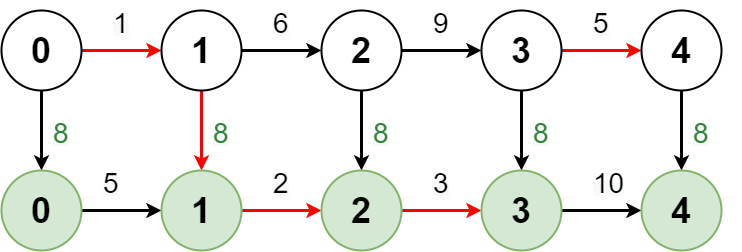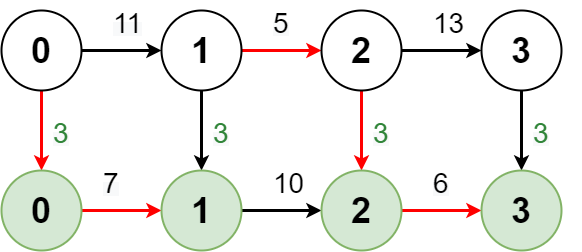| comments | difficulty | edit_url | tags | ||
|---|---|---|---|---|---|
true |
Hard |
|
A train line going through a city has two routes, the regular route and the express route. Both routes go through the same n + 1 stops labeled from 0 to n. Initially, you start on the regular route at stop 0.
You are given two 1-indexed integer arrays regular and express, both of length n. regular[i] describes the cost it takes to go from stop i - 1 to stop i using the regular route, and express[i] describes the cost it takes to go from stop i - 1 to stop i using the express route.
You are also given an integer expressCost which represents the cost to transfer from the regular route to the express route.
Note that:
- There is no cost to transfer from the express route back to the regular route.
- You pay
expressCostevery time you transfer from the regular route to the express route. - There is no extra cost to stay on the express route.
Return a 1-indexed array costs of length n, where costs[i] is the minimum cost to reach stop i from stop 0.
Note that a stop can be counted as reached from either route.
Example 1:
Input: regular = [1,6,9,5], express = [5,2,3,10], expressCost = 8 Output: [1,7,14,19] Explanation: The diagram above shows how to reach stop 4 from stop 0 with minimum cost. - Take the regular route from stop 0 to stop 1, costing 1. - Take the express route from stop 1 to stop 2, costing 8 + 2 = 10. - Take the express route from stop 2 to stop 3, costing 3. - Take the regular route from stop 3 to stop 4, costing 5. The total cost is 1 + 10 + 3 + 5 = 19. Note that a different route could be taken to reach the other stops with minimum cost.
Example 2:
Input: regular = [11,5,13], express = [7,10,6], expressCost = 3 Output: [10,15,24] Explanation: The diagram above shows how to reach stop 3 from stop 0 with minimum cost. - Take the express route from stop 0 to stop 1, costing 3 + 7 = 10. - Take the regular route from stop 1 to stop 2, costing 5. - Take the express route from stop 2 to stop 3, costing 3 + 6 = 9. The total cost is 10 + 5 + 9 = 24. Note that the expressCost is paid again to transfer back to the express route.
Constraints:
n == regular.length == express.length1 <= n <= 1051 <= regular[i], express[i], expressCost <= 105
We define
Next, we consider how to transition the states of
If we arrive at station
where
If we arrive at station
where
We denote the answer array as
Finally, we return
The time complexity is
class Solution:
def minimumCosts(
self, regular: List[int], express: List[int], expressCost: int
) -> List[int]:
n = len(regular)
f = [0] * (n + 1)
g = [inf] * (n + 1)
cost = [0] * n
for i, (a, b) in enumerate(zip(regular, express), 1):
f[i] = min(f[i - 1] + a, g[i - 1] + a)
g[i] = min(f[i - 1] + expressCost + b, g[i - 1] + b)
cost[i - 1] = min(f[i], g[i])
return costclass Solution {
public long[] minimumCosts(int[] regular, int[] express, int expressCost) {
int n = regular.length;
long[] f = new long[n + 1];
long[] g = new long[n + 1];
g[0] = 1 << 30;
long[] cost = new long[n];
for (int i = 1; i <= n; ++i) {
int a = regular[i - 1];
int b = express[i - 1];
f[i] = Math.min(f[i - 1] + a, g[i - 1] + a);
g[i] = Math.min(f[i - 1] + expressCost + b, g[i - 1] + b);
cost[i - 1] = Math.min(f[i], g[i]);
}
return cost;
}
}class Solution {
public:
vector<long long> minimumCosts(vector<int>& regular, vector<int>& express, int expressCost) {
int n = regular.size();
long long f[n + 1];
long long g[n + 1];
f[0] = 0;
g[0] = 1 << 30;
vector<long long> cost(n);
for (int i = 1; i <= n; ++i) {
int a = regular[i - 1];
int b = express[i - 1];
f[i] = min(f[i - 1] + a, g[i - 1] + a);
g[i] = min(f[i - 1] + expressCost + b, g[i - 1] + b);
cost[i - 1] = min(f[i], g[i]);
}
return cost;
}
};func minimumCosts(regular []int, express []int, expressCost int) []int64 {
n := len(regular)
f := make([]int, n+1)
g := make([]int, n+1)
g[0] = 1 << 30
cost := make([]int64, n)
for i := 1; i <= n; i++ {
a, b := regular[i-1], express[i-1]
f[i] = min(f[i-1]+a, g[i-1]+a)
g[i] = min(f[i-1]+expressCost+b, g[i-1]+b)
cost[i-1] = int64(min(f[i], g[i]))
}
return cost
}function minimumCosts(regular: number[], express: number[], expressCost: number): number[] {
const n = regular.length;
const f: number[] = new Array(n + 1).fill(0);
const g: number[] = new Array(n + 1).fill(0);
g[0] = 1 << 30;
const cost: number[] = new Array(n).fill(0);
for (let i = 1; i <= n; ++i) {
const [a, b] = [regular[i - 1], express[i - 1]];
f[i] = Math.min(f[i - 1] + a, g[i - 1] + a);
g[i] = Math.min(f[i - 1] + expressCost + b, g[i - 1] + b);
cost[i - 1] = Math.min(f[i], g[i]);
}
return cost;
}We notice that in the state transition equations of
class Solution:
def minimumCosts(
self, regular: List[int], express: List[int], expressCost: int
) -> List[int]:
n = len(regular)
f, g = 0, inf
cost = [0] * n
for i, (a, b) in enumerate(zip(regular, express), 1):
ff = min(f + a, g + a)
gg = min(f + expressCost + b, g + b)
f, g = ff, gg
cost[i - 1] = min(f, g)
return costclass Solution {
public long[] minimumCosts(int[] regular, int[] express, int expressCost) {
int n = regular.length;
long f = 0;
long g = 1 << 30;
long[] cost = new long[n];
for (int i = 0; i < n; ++i) {
int a = regular[i];
int b = express[i];
long ff = Math.min(f + a, g + a);
long gg = Math.min(f + expressCost + b, g + b);
f = ff;
g = gg;
cost[i] = Math.min(f, g);
}
return cost;
}
}class Solution {
public:
vector<long long> minimumCosts(vector<int>& regular, vector<int>& express, int expressCost) {
int n = regular.size();
long long f = 0;
long long g = 1 << 30;
vector<long long> cost(n);
for (int i = 0; i < n; ++i) {
int a = regular[i];
int b = express[i];
long long ff = min(f + a, g + a);
long long gg = min(f + expressCost + b, g + b);
f = ff;
g = gg;
cost[i] = min(f, g);
}
return cost;
}
};func minimumCosts(regular []int, express []int, expressCost int) []int64 {
f, g := 0, 1<<30
cost := make([]int64, len(regular))
for i, a := range regular {
b := express[i]
ff := min(f+a, g+a)
gg := min(f+expressCost+b, g+b)
f, g = ff, gg
cost[i] = int64(min(f, g))
}
return cost
}function minimumCosts(regular: number[], express: number[], expressCost: number): number[] {
const n = regular.length;
let f = 0;
let g = 1 << 30;
const cost: number[] = new Array(n).fill(0);
for (let i = 0; i < n; ++i) {
const [a, b] = [regular[i], express[i]];
const ff = Math.min(f + a, g + a);
const gg = Math.min(f + expressCost + b, g + b);
[f, g] = [ff, gg];
cost[i] = Math.min(f, g);
}
return cost;
}
